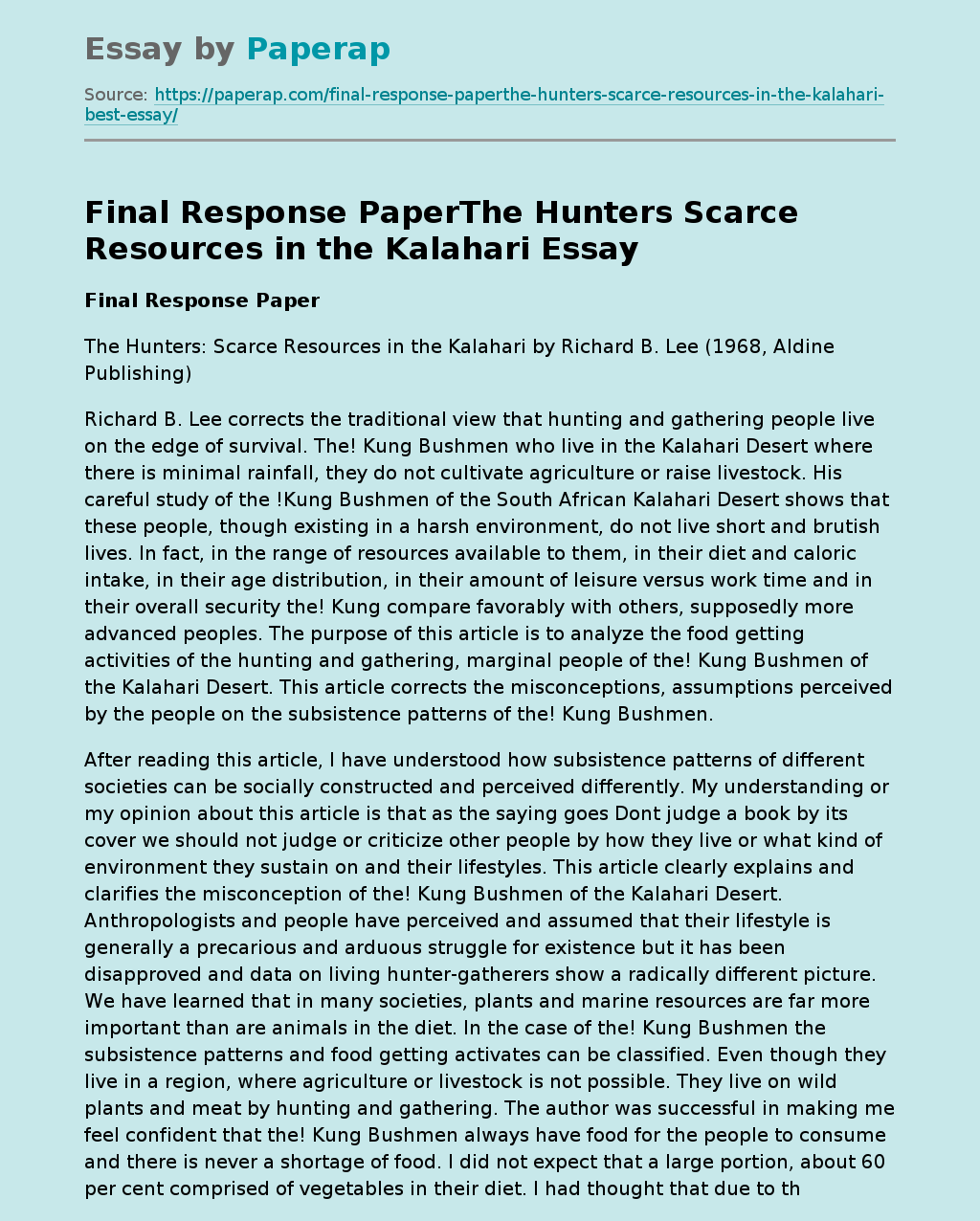Final Response PaperThe Hunters Scarce Resources in the Kalahari
Final Response Paper
The Hunters: Scarce Resources in the Kalahari by Richard B. Lee (1968, Aldine Publishing)
Richard B. Lee corrects the traditional view that hunting and gathering people live on the edge of survival. The! Kung Bushmen who live in the Kalahari Desert where there is minimal rainfall, they do not cultivate agriculture or raise livestock. His careful study of the !Kung Bushmen of the South African Kalahari Desert shows that these people, though existing in a harsh environment, do not live short and brutish lives.
In fact, in the range of resources available to them, in their diet and caloric intake, in their age distribution, in their amount of leisure versus work time and in their overall security the! Kung compare favorably with others, supposedly more advanced peoples. The purpose of this article is to analyze the food getting activities of the hunting and gathering, marginal people of the! Kung Bushmen of the Kalahari Desert.
This article corrects the misconceptions, assumptions perceived by the people on the subsistence patterns of the! Kung Bushmen.
After reading this article, I have understood how subsistence patterns of different societies can be socially constructed and perceived differently. My understanding or my opinion about this article is that as the saying goes Dont judge a book by its cover we should not judge or criticize other people by how they live or what kind of environment they sustain on and their lifestyles. This article clearly explains and clarifies the misconception of the! Kung Bushmen of the Kalahari Desert. Anthropologists and people have perceived and assumed that their lifestyle is generally a precarious and arduous struggle for existence but it has been disapproved and data on living hunter-gatherers show a radically different picture. We have learned that in many societies, plants and marine resources are far more important than are animals in the diet. In the case of the! Kung Bushmen the subsistence patterns and food getting activates can be classified. Even though they live in a region, where agriculture or livestock is not possible. They live on wild plants and meat by hunting and gathering. The author was successful in making me feel confident that the! Kung Bushmen always have food for the people to consume and there is never a shortage of food. I did not expect that a large portion, about 60 per cent comprised of vegetables in their diet. I had thought that due to the !Kung Bushmen being a hunting gathering society their diet would comprise mostly of meat but it was not and the author proved that it wasnt true. Even though the environment is harsh, they tend to collect and have more food than they can consume. I have also changed my understanding and perception towards the hunter-gatherer societies and we should not perceive something without full information, data and deep understanding.
Due to this article people that have perceived and had the misconception of the lifestyles and subsistence of the hunting and gathering societies and also different types of foragers, people will have a clear view that life in the state of nature is not necessarily nasty, brutish, harsh and short. Peoples perspective towards hunting and gathering will be of a persistent and well-adapted way of life. To conclude I would strongly recommend Richard`s article to people who wants to understand more about hunting gathering societies.
Final Response PaperThe Hunters Scarce Resources in the Kalahari. (2019, Dec 04). Retrieved from https://paperap.com/final-response-paperthe-hunters-scarce-resources-in-the-kalahari-best-essay/

